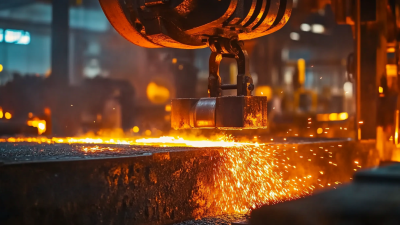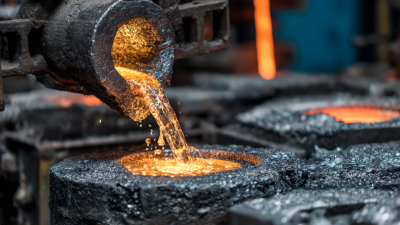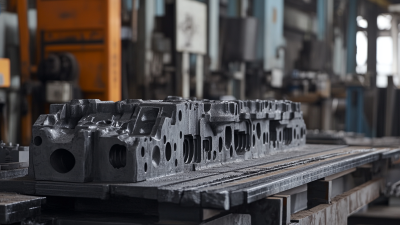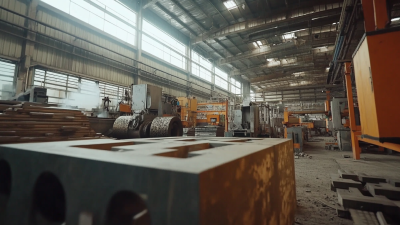 +86 180 0293 5268
+86 180 0293 5268






In today's competitive manufacturing landscape, the optimization of production processes is crucial for success, and one of the most effective ways to achieve this is through the use of Precision Machining Parts. These intricately crafted components offer unparalleled accuracy and consistency, ensuring that your products meet the highest standards of quality. As industries demand increasingly sophisticated machinery and equipment, manufacturers are turning to precision machining as a solution to enhance their operational efficiencies.

This blog will explore the numerous advantages of incorporating Precision Machining Parts into your production line, from improved product performance to reduced waste and cost savings. Understanding how to leverage these benefits can significantly impact your overall manufacturing success and position your business for sustained growth in a challenging market.
Precision machining is a vital process in the manufacturing sector, distinguishing itself through its ability to produce components with exceptional accuracy and repeatability. This method utilizes advanced tools and technologies to achieve tight tolerances that traditional machining techniques often struggle to attain. The result is highly detailed parts that meet stringent specifications, making precision machining essential for industries such as aerospace, automotive, and medical devices.
When considering precision machining for your projects, it's crucial to select the right materials. Certain materials, such as titanium or high-strength alloys, can enhance the performance of your parts but may also require specialized tooling and techniques. Additionally, ensuring that your designs are optimized for machining can minimize waste and improve efficiency. For instance, integrating features that facilitate easier machining can lead to significant cost savings and faster production times.
Always keep in mind the importance of proper machine maintenance. Regular checks and calibrations can prevent unexpected downtimes and enhance the quality of the finished products. Establishing a routine for tool replacement and upkeep will not only ensure smooth operations but also maintain the precision levels that define this machining method, ultimately contributing to your manufacturing success.
Precision machining parts play a vital role in enhancing manufacturing efficiency across various industries. According to a recent report by the National Institute of Standards and Technology (NIST), employing precision machining techniques can reduce production time by up to 30%. This significant time savings directly correlates with lower manufacturing costs and improved output rates, enabling companies to meet market demands more effectively.
Moreover, precision machining provides higher tolerances, which is crucial for industries such as aerospace and medical devices where safety and performance are paramount. A study published by the American Society for Precision Engineering highlighted that components produced with precision machining exhibit a tolerance level of ±0.001 inches, minimizing the risk of part failure. This level of accuracy not only enhances product reliability but also decreases the likelihood of costly rework or scrap, further optimizing overall production efficiency. As manufacturers seek to improve their processes, the integration of precision machining parts is becoming increasingly essential for achieving sustained success.
| Benefit | Description | Impact on Efficiency |
|---|---|---|
| High Precision | Allows for tighter tolerances that improve product quality. | Reduces waste and rework, increasing overall productivity. |
| Complex Geometries | Capable of producing intricate designs that traditional machining cannot. | Enhances design flexibility, enabling innovative product solutions. |
| Material Versatility | Works with a wide range of materials including metals, plastics, and composites. | Improves the ability to source and use optimal materials for specific applications. |
| Automated Processes | Incorporates advanced technologies for efficiency. | Minimizes human error and increases throughput. |
| Short Lead Times | Faster production schedules due to efficient machining techniques. | Improves responsiveness to market demands and reduces time to market. |
Implementing precision machining in your manufacturing operations can significantly enhance product quality and efficiency. One of the top strategies is to invest in advanced machine tools and technology. This allows for tighter tolerances and greater consistency in the parts produced. When selecting machinery, prioritize features that offer automation and high-speed capabilities, as these will accelerate production while maintaining precision.

Another crucial tip is to focus on training your workforce. Skilled operators who understand the intricacies of precision machining can make a remarkable difference in production outcomes. Regular training programs and workshops will help ensure your team remains adept at utilizing the latest techniques and technologies. Additionally, fostering a culture of continuous improvement encourages employees to identify and address inefficiencies, leading to enhanced overall productivity.
Lastly, carefully plan your workflow to optimize the machining process. Implementing techniques like Lean Manufacturing can help reduce waste and improve efficiency. Regularly assess your supply chain relationships to ensure timely access to high-quality materials, as the raw materials you use will directly impact the precision of your final products. By incorporating these strategies, businesses can effectively leverage precision machining to achieve greater manufacturing success.
In today's competitive manufacturing landscape, product quality is paramount. Advanced precision machining techniques are revolutionizing the way parts are produced, ensuring higher accuracy, better surface finishes, and enhanced performance. By leveraging state-of-the-art technologies such as CNC machining, manufacturers can achieve tolerances that were once thought impossible. This not only improves the functionality of the parts but also reduces the likelihood of defects, ultimately leading to lower production costs and enhanced customer satisfaction.
Moreover, these techniques allow for greater design flexibility, enabling manufacturers to create complex geometries that traditional machining methods may struggle to produce. The use of precision machining increases material efficiency, minimizing waste while maximizing the potential of each component. As industries continue to evolve, adopting advanced precision machining will not only streamline production processes but also position manufacturers at the forefront of quality and innovation. Embracing these sophisticated approaches is essential for companies aiming to thrive in an ever-demanding market.
This bar chart illustrates the key advantages of precision machining, showcasing crucial metrics such as dimensional accuracy, surface finish quality, material waste reduction, production speed, and cost efficiency. These benefits demonstrate the effectiveness of advanced precision machining techniques in enhancing manufacturing success.
Precision machining plays a vital role in modern manufacturing, providing advantages such as accuracy, efficiency, and reduced waste. To enhance these processes cost-effectively, manufacturers are turning to advanced technologies and methodologies. According to a report by MarketsandMarkets, the global precision machining market is projected to reach $75.6 billion by 2025, growing at a CAGR of 6.5% from 2020. This growth is driven by the increasing demand for high-quality components across industries, including aerospace, automotive, and medical devices.
One effective approach to enhancing precision machining processes is the implementation of automation and smart manufacturing techniques. A study conducted by Deloitte indicates that integrating automation can reduce production costs by up to 20% and significantly improve cycle times. Additionally, utilizing software for predictive maintenance can minimize equipment downtime, maximizing productivity. Investing in employee training and upskilling is another cost-effective method, enabling staff to operate advanced machinery efficiently, thereby optimizing the overall machining process. By embracing these strategies, manufacturers can not only reduce operational costs but also enhance the quality and precision of their machined parts, ensuring long-term success in a competitive landscape.







